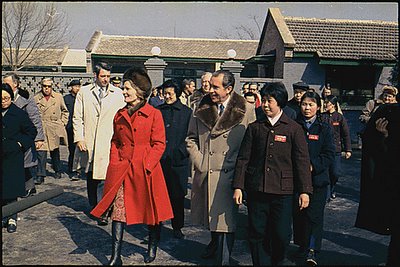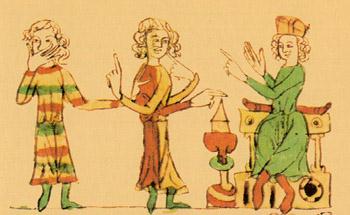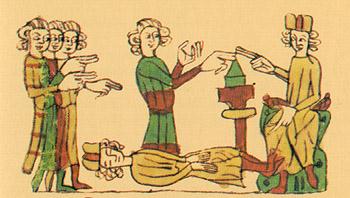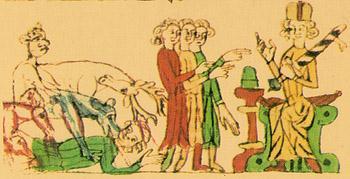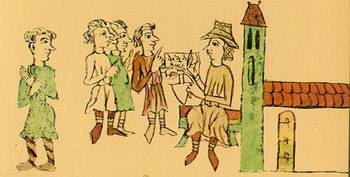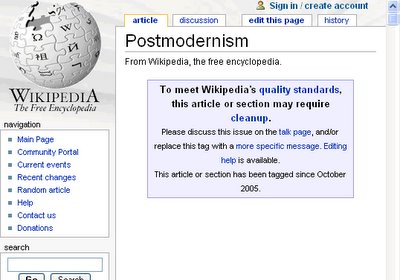(Crossposted from the American Constitution Soceity :: Columbia Law School)
Permit me to warn you that:
...still, I feel that it's all right for me to have an opinion on the state of the Alito nomination.
In his
odd lovesong to Joe Biden this week (NYT Select link), David Brooks opined that Biden's filibusterous Alito nomination hearings comments were said "like the last Spartan at Thermopylae... noble objection(s) before succumbing manfully to the inexorable will of fate." ...and that's where we're at. Alito's nomination will be confirmed.
For all their noble objections, could progressives have received a more palatable candidate from the Bush Administration? Let's review the options that were on the table. On July 1, the same day O'Connor announced her retirement and 2 months before Rehnquist passed away,
the Washington Post published its short list of potential SCOTUS nominees:
- Samuel A. Alito, Jr.
- Janice Rogers Brown
- Edith Brown Clement
- John Cornyn
- Emilio M. Garza
- Alberto R. Gonzales
- Edith Hollan Jones
- J. Michael Luttig
- Michael W. McConnell
- Theodore B. Olson
- John G. Roberts
- Larry Thompson
- J. Harvie Wilkinson
Would any of these candidates leave progressives feeling more satisfied?
 Janice Rogers Brown:
Janice Rogers Brown: Labeled
Filibuster Candidate Number One by WorkingForChange, her nomination to the DC Circuit Court of Appeals was already stalled for two years due to Democratic opposition.
After being appointed to the CA Supreme Court in 1996 (despite the State Bar of California's Commission on Judicial Nominees Evaluation rating her as "not qualified"), she's
authored a number of decisions and dissents that are irksome even to those who barely lean left.
Trust me, you weren't going to feel any better if it were Janice Rogers Brown.
 Edith Brown Clement:
Edith Brown Clement: Profiled by the People for the American Way in
Confirmed Judges Confirm Our Worst Fears, Judge Clement is the unknown of the list — granted, not a Harriet-Miers-level unknown, but a judge
who has authored few notable opinions.
Maybe you suspected that former nominee Miers was a progressive in Bush regent's clothing. I did. I sure don't think the same of Clement.
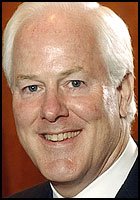 John Cornyn:
John Cornyn: Senator Cornyn is the junior US Senator from Texas.
The Washington Post notes:
In the Senate, Cornyn, 53, has led efforts to defend Bush's judicial nominees and to fight filibusters of nominees, writing National Review articles that label opponents as "liberal special interest groups" engaged in "vicious politics." He spearheaded the push to adopt constitutional amendments banning gay marriage and flag-burning and favors school vouchers, prayer in public schools, extending the Bush-initiated tax cuts beyond 2010 and privatizing Social Security. He opposes abortion and partial birth abortions except when a woman's life is endangered.You'd prefer Cornyn over Alito?
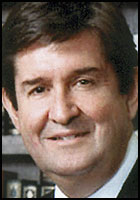 Emilio M. Garza:
Emilio M. Garza: Judge Garza was originally interviewed in 1991 for the seat
eventually occupied by Clarence Thomas.
Before the Alito nomination was announced, conservative support for the nomination of Garza bordered on the offensive,
arguing that Garza's ethnicity created a filibuster-proof shield, independent of his judicial record.
Garza's anti-Roe statements are more strongly worded than Alito's: "[I]n the absence of governing constitutional text, I believe that ontological issues such as abortion are more properly decided in the political and legislative arenas ...[I]t is unclear to me that the [Supreme] Court itself still believes that abortion is a 'fundamental right' under the Fourteenth Amendment..."
[Source (.pdf link)]
You'd still prefer Garza?
 Alberto Gonzales:
Alberto Gonzales: Although Attorney General Gonzales might have seemed like a borderline viable SCOTUS nominee on July 1 of last year, subsequent events make his nomination too unlikely to reasonably consider.
Conservative causes generally have not been wounded by the DeLay scandal, the Abramhoff scandal, the FISA scandal, the torture scandal, and the Miers nomination debacle... but the Bush Administration has suffered. Gonzales' star is hitched to the Bush Administration's wagon. Until they dig their ratings out of the
defeat-by-a-landslide-if-an-election-were-held-today area, his odds of SCOTUS nomination are only slightly higher than mine.
 Edith Hollan Jones:
Edith Hollan Jones: Quoting
Wikipedia is always risky business, but here goes:
Some view Jones as an outspoken conservative. In her opinions, she has questioned the legal reasoning which legalized abortion, advocated streamlining death penalty cases, invalidated a federal ban on possession of machine guns and advocated toughening bankruptcy laws.SCOTUSblog has more on her story. I encourage you to learn more about Judge Jones, but I don't think that learning more about her will make you more comfortable with her than you are with Alito.
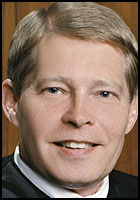 J. Michael Luttig:
J. Michael Luttig: To be honest with you, I thought Luttig would get the nod after the Miers withdrawl. Looks like SCOTUSblog
might have shared the same opinion.
The Washington Post notes the following about Luttig:
In 2000, he dissented from a ruling by Wilkinson that upheld a Fish and Wildlife Service regulation limiting the killing of endangered wolves on private land. He also disagreed with Wilkinson in 2003, when he wrote a dissenting opinion that supported the Bush administration's position that it could designate and detain "enemy combatants" with little judicial scrutiny.
In 1998, he upheld Virginia's ban on the procedure known as a partial birth abortion — but agreed to let it be struck down after the Supreme Court struck down a similar Nebraska law in 2000.
You'd prefer him to Alito?
 Michael W. McConnell:
Michael W. McConnell: Judge/Professor McConnell's
criticism of the Supreme Court's Bush v. Gore decision probably would win him some credibility from the blue side of the Senatorial aisle.
However, in 1996,
McConnell signed a statement supporting a constitutional amendment to ban abortion. "Abortion kills 1.5 million innocent human beings in America every year... We believe that the abortion license is a critical factor in America's virtue deficit."
If he still thinks that a constitutional amendment barring abortion is a good idea, his stance is several notches more severe than Alito's view.
Would you choose McConnell?
 Theodore Olson:
Theodore Olson: Frustrated with the split court in
Hamdi v. Rumsfeld, then Solicitor General Olson told the Federalist Society that "U.S. courts ... have never been extended so far."
As Solicitor General during the first Bush term, Olson has been a familiar figure to SCOTUS watchers.
Now back in private practice,
the Washington Post notes that Olson's choice of clients and arguments belie his conservative views:
He argued Bush's case before the Supreme Court that decided the outcome of the disputed 2000 presidential election.His other cases have included representing Cheryl Hopwood, who argued that affirmative action in admissions at the University of Texas was a violation of the Constitution. In 1996, a federal appeals court agreed with Olson and Hopwood that the university's policy was unconstitutional. That same year, he represented the Virginia Military Institute before the Supreme Court against claims that the school's admissions policy discriminated against women and lost. Olson was legal counsel to Reagan during the investigation of the Iran-contra affair. And he represented Jonathan Pollard, who was convicted of selling government secrets to Israel, in his failed bid for a reduction of his life sentence.
You'd choose Olson over Alito?
 John Roberts:
John Roberts: Already on the court and voting in the minority on
Gonzales v. Oregon.
 Larry Thompson:
Larry Thompson: Corporate lawyer, former deputy Attorney General, current senior vice president and general counsel at Pepsico, current senior fellow at the Brookings Institution.
You're more comfortable with this jurisprudential blank slate than you are with Samuel Alito?
 J. Harvie Wilkinson:
J. Harvie Wilkinson: Experienced journalist, appellate judge, teacher.
The Washington Post notes that "his paper trail is... immense. He has written not only legal opinions, but also books, speeches and journal articles in which he sketches a self-consciously moderate conservative philosophy."
You'd think that Wilkinson would be qualified for SCOTUS; however, it appears that he
failed the Presidential Fitness test during Bush's last search for a nominee.
From this list, who would you prefer to Alito? Why?
 If you have the new version of Google Earth installed, this link will take you to the gravity defying Flying Car of Perth.
If you have the new version of Google Earth installed, this link will take you to the gravity defying Flying Car of Perth.